Local
An end to Kameny burial stalemate?
‘Tentative agreement’ could clear way for interment of activist’s ashes
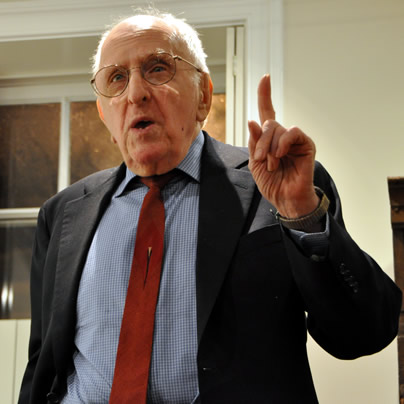
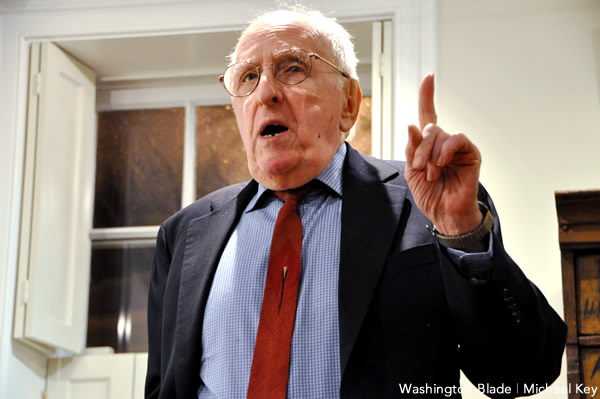
Frank Kameny died in October 2011 but his ashes remain in limbo due to a dispute between his estate and a local non-profit. (Washington Blade photo by Michael Key)
An attorney representing the estate of nationally acclaimed gay rights pioneer Frank Kameny said on Wednesday that a “tentative agreement” has been reached to end a dispute that has prevented Kameny’s ashes from being interred at D.C.’s Congressional Cemetery nearly two years after his death.
Christopher Brown, an attorney with the gay-owned law firm Ackerman Brown, said the tentative agreement was reached on July 9 with Helping Our Brothers and Sisters (HOBS), a local LGBT charitable group that bought a plot for the burial of Kameny’s ashes at Congressional Cemetery after soliciting donations from the community to pay for it following Kameny’s death on Oct. 11, 2011.
Brown’s comment came one day after Ackerman Brown’s client, Timothy Clark, Kameny’s longtime friend and heir to his estate, told the Blade that he understood that an agreement between the two parties over the cemetery plot had been reached.
“We reached an agreement on that so I’m going to keep the burial plot,” Clark said in a telephone interview.
“I just have to decide on when I want to have something,” he said in referring to a burial ceremony at the cemetery. “I just don’t know. But I’m open to any suggestions that anybody wants to have because that was Frank’s life. The gay community was Frank’s life. That’s what he fought for.”
HOBS and a group of Kameny’s friends and colleagues in the LGBT rights movement initially scheduled an interment ceremony for Kameny at the cemetery for March 3, 2012. But they abruptly cancelled it after the estate reportedly told the cemetery it would not release Kameny’s ashes until it obtained legal ownership of the burial plot from HOBS.
For more than a year, HOBS and Ackerman Brown have declined to publicly disclose specific details of the nature of the dispute between the two parties over the burial plot other than to say they were negotiating an agreement to enable HOBS to transfer ownership of the plot to the estate.
“[W]e would point out that HOBS has never stood in the way of or delayed the burial of Dr. Kameny’s ashes,” said HOBS President Marvin Carter in an email to the Blade earlier this month. “HOBS has made numerous proposals and overtures to the Kameny estate to have Dr. Kameny’s remains buried at Congressional Cemetery.”
Brown told the Blade in an email on Wednesday that the estate, which is in possession of Kameny’s ashes, also is interested in moving ahead with the burial.
“The estate has always been, and remains willing to work with gay community representatives who knew Frank Kameny in organizing a burial service and appropriate gravesite at which members of the community could pay tribute to Kameny,” Brown said in his email.
In response to a request from the Blade last month, HOBS on Wednesday released information about the money it raised and spent both for Kameny’s personal needs in the last years of his life and for expenses related to Kameny’s funeral and planned burial.
HOBS’s IRS 990 finance reports filed with the IRS for 2010 and 2011 – the most recent such reports publicly available for HOBS – don’t include specific information about money raised for Kameny-related projects.
But the reports show that HOBS’s income increased dramatically in 2010 and 2011 during a period when the non-profit, tax-exempt group and its supporters appealed to the LGBT community for Kameny-related donations — initially to help Kameny pay household expenses and property taxes and later for Kameny’s funeral and burial.
The 990 reports, which all tax-exempt organizations are required to file, show that HOBS’s income was $2,125 in 2008, the first year for which such figures are reported, and $6,544 in 2009. The reports show that in 2010, HOBS’s income rose to $61,480 and in 2011 its income increased to $115,440.
In an op-ed column published in the Blade just before the Thanksgiving holiday in November 2011, Carter discussed efforts by HOBS and other groups and individuals to arrange two separate memorial services for Kameny, one of which was held at the Carnegie Library building in downtown D.C.
“Thus far, with the generosity of many friends, we have covered expenses for Kameny’s viewing at Carnegie Library and his essential funeral costs, too,” which Carter later explained involved paying for Kameny’s cremation and the rental of a casket and the service of a funeral hearse for the viewing ceremony.
“In addition, we have now paid the deposit on a fitting, public gravesite for Kameny at the historic Congressional Cemetery,” he said in the op-ed. “For all who wish to help raise the remaining $4,000 anticipated; you may make your tax-deductible contribution online…or simply mail a check to HOBS…”
The Blade and other local publications also published stories on HOBS’s Kameny-related fundraising activities for the funeral and burial and efforts by HOBS to help Kameny prior to his death.
One effort organized by local gay activist Ben Carver in 2010 was billed as the “Buy Frank a Drink” campaign, which Carver promoted on a Facebook page.
HOBS’s 990 report for 2012, which would include that year’s income, has yet to be released by the charitable watchdog group Guidestar.com, which obtains 990 reports for nearly all U.S. non-profit groups each year from the IRS. HOBS’s 990 report for 2010 was filed in November 2011, and its 2011 report was filed in November 2012. This suggests that its 2012 990 report will likely be filed in November of this year.
The 2011 report shows that HOBS during that year spent $66,413 on “direct support to qualified individuals,” $20,222 on “mentoring programs,” and $11,605 on “educational programs.”
Those three programs, which came to a total of $98,240, accounted for the bulk of HOBS’s expenditures for that year. The 2011 report shows that all other expenses were under $4,000 and were for administrative and overhead expenses such as supplies ($3,727), board meetings ($1,007), Internet ($1,555), meals and entertainment ($505), and telephone ($1,494). More detail on those reported expenses wasn’t available.
Carter discussed HOBS’s mission in an email he sent the Blade on July 24, which also provided information about money HOBS raised and spent on Kameny-related projects.
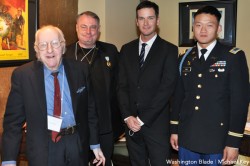
The late Frank Kameny (left) standing next to Marvin Carter at a HOBS benefit dinner in 2010. (Washington Blade file photo by Michael Key)
HOBS “is an all-volunteer micro-charity that helps marginalized LGBT individuals in our community to meet short-term and often life-sustaining needs,” Carter said. “We focus on helping those who often do not fit the criteria for help from other organizations or agencies – filling gaps in human distress here in Washington, D.C. A sizable portion of our work involves discrimination cases too, many involving torture and asylum,” said Carter, referring to cases noted on the group’s website in which HOBS assists LGBT foreign nationals seeking U.S. political asylum to escape persecution in their home country.
“Before his passing, HOBS assisted Dr. Kameny frequently with some of his essential needs, including transportation for doctor’s appointments, the use of a mobile phone, groceries and meals, urgent bathroom plumbing repairs, repair of his eyewear, and the payment of past property tax bills to prevent his home foreclosure – spending in total thousands of dollars in the years before his death,” Carter said.
Carter provided these figures and related information in connection with the contributions HOBS received and expenditures it incurred for Kameny-related projects in 2010 and 2011:
- Contributions earmarked by donors for Kameny’s burial expenses totaled about $800.
- Other donors “make clear that their donations may be used for HOBS’ general mission,” were silent about how to use the donations.
- During this period, “approximately $15,000 was raised in connection with our general fundraising efforts.”
- HOBS incurred expenses totaling approximately $8,500 related to the purchase of a cemetery plot for Kameny at Congressional Cemetery, cremation expenses and “other expenses of the funeral home (including rental of a casket and hearse for transporting Dr. Kameny’s ashes to the memorial service…and a gravesite marker reading ‘Gay is Good.’”
- There was no surplus of funds from contributions for Kameny’s burial and memorial service efforts. HOBS used money from its general operating account to cover the Kameny funeral and burial expenses not covered by earmarked donations.
- HOBS did not solicit funds for payment of Kameny’s property taxes in 2011. It did raise money for and contributed to Kameny’s property tax payments in 2010.
Maryland
Silver Spring holds annual Pride In The Plaza
‘Today means inclusion. It means to build resilience’

Silver Spring’s annual Pride in the Plaza event took place on Sunday to celebrate the LGBTQ community and emphasize inclusion and resilience.
“Today means inclusion. It means to build resilience, love,” Robyn Woods, program and outreach director for Live In Your Truth, which organized the event, said. “I mean, just being surrounded by the community and so many great entrepreneurs, business owners, and just being a part of this whole rainbow coalition that we call the LGBTQIA to be about.”
With the event being her first time organizing for Live In Your Truth, Woods said she felt emotional to see the support and love at the event.
“Some people (are) bringing out their children, their babies, their grandparents,” Woods said. “It’s a lot more allies here than anything else. That type of support to me means so much more than just support from my community; just outside support, inside support, so much support around it, so much love. Everyone’s smiling outside, helping each other.”
Attendees of the event were able to head over to the Family Fun Zone, an air-conditioned Pride Cool Down Lounge, or watch live drag performances in the main stage area.
Along with entertainment and a shaved-ice stand, rows of information tables stood along the plaza, including FreeState Justice, the Washington Spirit, Trans Maryland, Moco Pride Center, and the Heartwood Program, an organization that offers support, therapy, education, and resources to the LGBTQ community.
“I want people to know about our services, and I love what we have to offer,” Jessica Simon, psychotherapist for Heartwood Program’s Gender Wellness Clinic, said. “I (also) want to be part of a celebration with the community, and so it feels good to be here with other people who have something they want to give to the community.”
She added that within today’s political climate, to which she called an “antidote to shame,” it’s important to be celebrating Pride.
“There’s a lot of demonization of LGBTQI people,” Siena Iacuvazzi, facilitator for Maryland Trans Unity, said. “(Pride) is part of the healing process.”
Iacuvazzi said she was taught to be ashamed of who she was growing up, but being a part of a community helped her flourish in the future.
“I was taught how to hate myself. I was taught that I was an abomination to God,” she said. “But being a community is like understanding that there are people who have experienced the same thing, and they’re flourishing. They’re flourishing because they’re willing to stand up for themselves as human beings and discover themselves and understand what’s true for themselves.”
She added that Pride allows for a mutual understanding to take place.
“It’s more of a sense of belonging … and just taking that home and understanding you’re not alone,” Iacuvazzi said. “We’re each taking our own journey — we’re not putting that on each other. It’s just walking away with a sense of belonging and humanity.”
Similar to Iacuvazzi, Woods said she hopes attendees’ biggest takeaways would be family, fun, resilience, and pride.
“Being proud of yourself, being happy for who you are, and representation and how much it matters,” she continued. “And I think all these young people that are walking around here get to see versions of themselves, but older. They get to see so many different lesbian, gay, bisexual, pansexual people that are successful, that are showing love, that care, and it’s not how we’re portrayed in the media. It’s lovely to see it out here. (It’s) like we’re one big old, happy family.”
Virginia
Spanberger touts equality, reproductive rights in Arlington
Democratic Va. gubernatorial nominee made campaign stop at Freddie’s Beach Bar
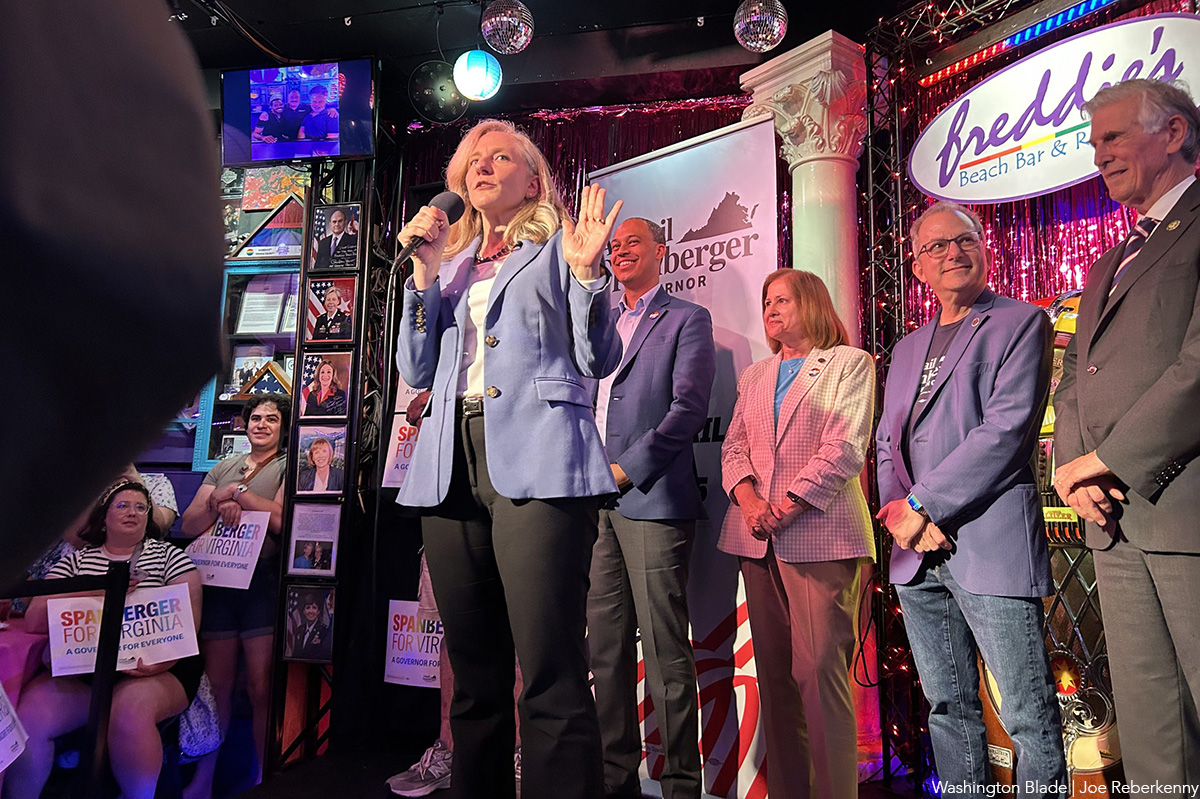
With the general election heating up and LGBTQ rights under increasing threat nationwide, Virginia gubernatorial candidate Abigail Spanberger brought her “Span Virginia Bus Tour” to Arlington’s Freddie’s Beach Bar for a campaign stop filled with cheers, policy pledges, and community spirit.
Spanberger, who served three terms in the U.S. House of Representatives from 2019 through early 2025 for Virginia’s 7th Congressional District, also served as a federal law enforcement officer specializing in narcotics and money laundering cases, and as a CIA case officer working on counterterrorism and nuclear counterproliferation.
Spanberger is running against Republican nominee Winsome Earle-Sears, the current lieutenant governor of Virginia, who said she was “morally opposed” to a bill protecting marriage equality in the commonwealth.
She was joined by other Democratic candidates and supporters: lieutenant gubernatorial candidate Ghazala Hashmi, attorney general candidate Jay Jones, Virginia state Sen. Adam Ebbin (D-Alexandria), and Congressman Don Beyer.
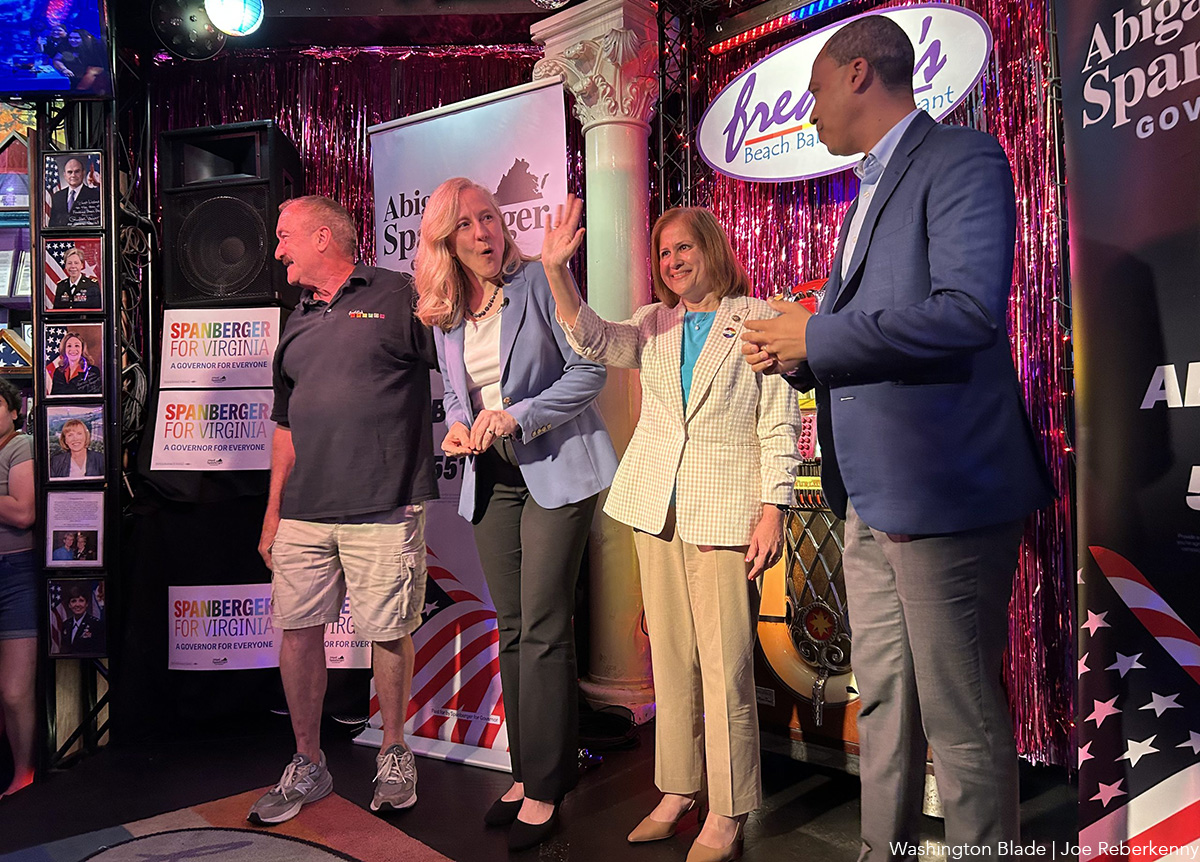
Freddie’s was packed wall-to-wall with supporters, many of whom wore “Spanberger for Virginia” shirts in the progressive Pride flag colors. In her speech, she made it clear that LGBTQ Virginians’ rights are on the ballot this year.
“I’m so excited to be here, and I am so grateful to the entire staff of Freddy’s for letting us overtake this incredible venue that is not just an awesome place to come together in community, but is a symbol to so many people of joy, of happiness, of community and of celebrating our friends and our neighbors,” Spanberger told the packed restaurant. “It is exciting to be here, and particularly during this Pride month, and particularly as we reflect on the 10-year anniversary of Obergefell and the reality that we still have so much work to do.”
“The reality is there are so many people who still would be inclined to take us backwards,” she said. “In this moment when we see attacks on people’s rights, on people’s humanity, on Virginia, on our economy, on research, on public education, on food security, on health care, on Virginians, on their jobs, on public service and on people — it can get heavy.”
“What it does for me is it makes me want to double down, because once upon a time, when I was talking to my mother about some horror show or sequence of activities coming out of a particular administration, she did not really have the patience to listen to me and said ‘Abigail, let your rage fuel you’ — and the conversation was over. And so I reflect on that, because, in fact, every day there is so much fuel to be had in this world and in this moment.”
One of the points Spanberger continued to emphasize was the importance of steadfast state government officials following the election of President Donald Trump, which has led to rollbacks of LGBTQ and bodily autonomy rights as a result of the conservative-majority U.S. Supreme Court.
“What the past few years have shown us is that a Supreme Court decision, no matter how many years we have celebrated its existence, does not protect us in the long term. And so as governor, I will work to make sure that every protection we can put in place for the dignity, the value, and the equal rights of all Virginians is a priority.”
During her speech, Spanberger highlighted several of the key values driving her campaign — protecting reproductive freedom and human rights, lowering healthcare costs, safeguarding Virginia’s environment, and ensuring that public education is affordable, accessible, and rooted in truth, not politics.
Spanberger went as far as to say that she wants to amend the state’s constitution to remove Section 15-A. “The reality is that in Virginia, we still have a ban in our state constitution on marriage equality. It is of the utmost urgency that we move forward with our constitutional amendment.”
“We will work to ensure that that terrible constitutional amendment, that was put in years ago, is taken out and updated and ensuring that Virginia is reflective in our most essential documents of who we are as a commonwealth, which is an accepting place that celebrates the vibrancy of every single person and recognizes that all Virginians have a place, both in that constitution and in law,” she added.
Following the event, two supporters spoke to the Washington Blade about why they had come out to support Spanberger.
“I came out because I needed to show support for this ticket, because it has been a particularly rough week, but a long few years for our rights in this country, in this state, with this governor, and it’s — we need to flip it around, because queer people need protection,” said Samantha Perez, who lives in Ballston. “Trans people need protection. Trans kids need protection. And it’s not gonna happen with who’s in Richmond right now, and we just need to get it turned around.”
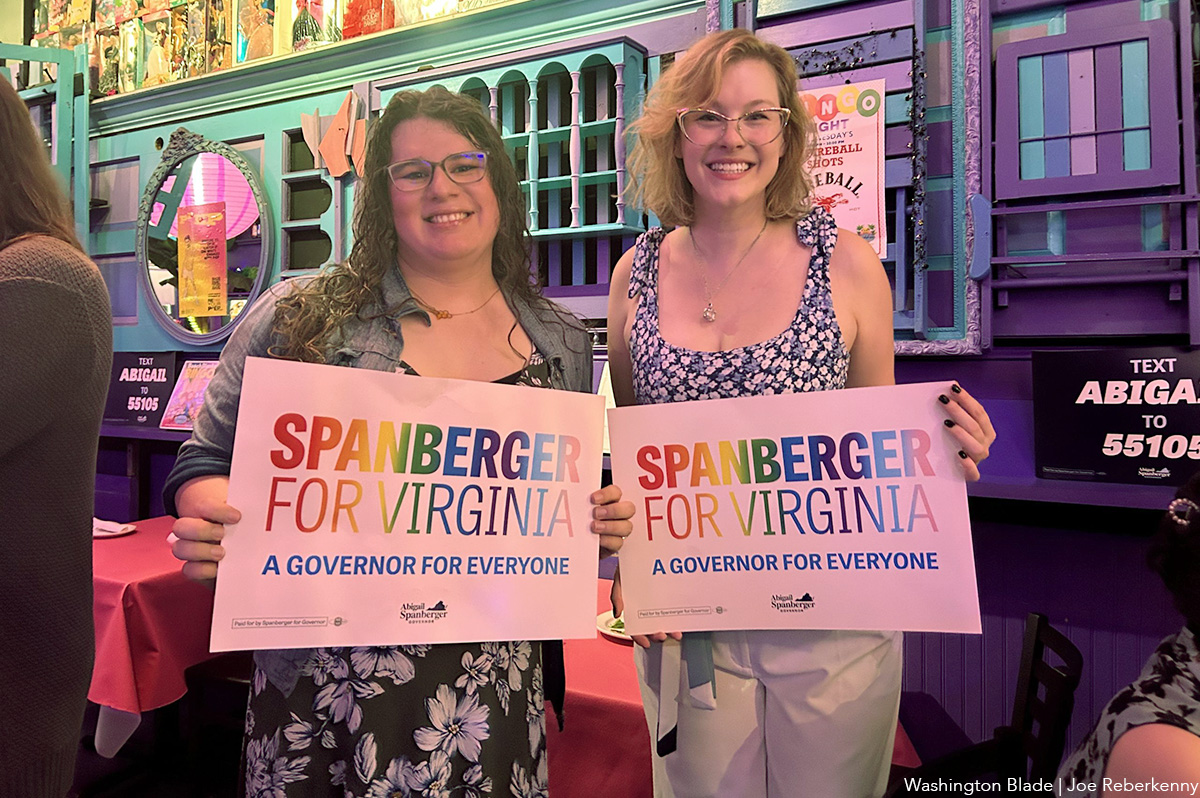
“The whole neighborhood’s here. All our friends are here,” said Annie Styles of Pentagon City. “It means the world to me to take care of each other. That’s what a good community does. That’s not what we’ve had with the Republicans here or across the nation for a really long time. It’s time to show that care. It’s time to make sure that good people are in a position to do good things.”
District of Columbia
Activists protest outside Hungarian Embassy in DC
Budapest Pride scheduled to take place Saturday, despite ban

More than two dozen activists gathered in front of the Hungarian Embassy in D.C. on Friday to protest the country’s ban on Budapest Pride and other LGBTQ-specific events.
Amnesty International USA Executive Director Paul O’Brien read a letter that Dávid Vig, executive director of Amnesty International Hungary, wrote.
“For 30 years Budapest Pride has been a celebration of hope, courage, and love,” said Vig in the letter that O’Brien read. “Each march through the streets of Budapest has been a powerful testament to the resilience of those who dare to demand equality, but a new law threatens to erase Pride and silence everyone who demands equal rights for LGBTI people.”
“The Hungarian government’s relentless campaign against LGBTI rights represents a worrying trend that can spread normalizing division and hatred,” added Vig. “Thank you for standing with us when we refuse to be intimidated.”
Council for Global Equality Chair Mark Bromley and two of his colleagues — Stephen Leonelli and Keifer Buckingham — also spoke. Health GAP Executive Director Asia Russell and Chloe Schwenke, a political appointee in the Obama-Biden administration who worked for the U.S. Agency for International Development, and Planned Parenthood staffers are among those who attended the protest.
(Washington Blade video by Michael K. Lavers)
Hungarian lawmakers in March passed a bill that bans Pride events and allow authorities to use facial recognition technology to identify those who participate in them. MPs in April amended the Hungarian constitution to ban public LGBTQ events.
Budapest Pride is scheduled to take place on Saturday, despite the ban. Hundreds of European lawmakers are expected to participate.
“Sending strength to the patriotic Hungarians marching tomorrow to advance human dignity and fundamental rights in a country they love,” said David Pressman, the gay former U.S. Ambassador to Hungary, on Friday on social media.
Sending strength to the patriotic Hungarians marching tomorrow to advance human dignity and fundamental rights in a country they love. Szabadság és szerelem. My past remarks on Budapest Pride: https://t.co/y1QhA9QouA
— David Pressman (@AmbPressman) June 27, 2025
-

 U.S. Supreme Court4 days ago
U.S. Supreme Court4 days agoSupreme Court upholds ACA rule that makes PrEP, other preventative care free
-

 U.S. Supreme Court4 days ago
U.S. Supreme Court4 days agoSupreme Court rules parents must have option to opt children out of LGBTQ-specific lessons
-

 National5 days ago
National5 days agoEvan Wolfson on the 10-year legacy of marriage equality
-

 Congress5 days ago
Congress5 days agoSenate parliamentarian orders removal of gender-affirming care ban from GOP reconciliation bill












